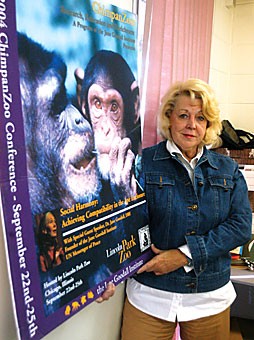Chimpanzees’ television habits and their reaction to death are part of an ongoing study by four UA students and an alumnus, who are aiming to better the lives of captive chimpanzees through an international organization based in Tucson.
ChimpanZoo is a branch of the Jane Goodall institute that has been working from Tucson to enrich the lives of chimpanzees in zoos for nearly 20 years, said Virginia Landau, a UA alumna and director of ChipmanZoo, located in the Babcock building.
Since it began in 1986, ChimpanZoo has gathered and collected data pertinent to the lives of zoo chimpanzees. Although ChimpanZoo has no legal function, this data serves as a launching point for zookeepers and lawmakers, who often choose to adopt the information, Landau said.
A study in a St. Louis zoo that illustrated the behavioral effects of death upon chimpanzees was discussed at the annual ChimpanZoo conference held last week in Los Angeles.
Often, when a chimpanzee in a zoo is ill or dies, it is taken away from its former playmates, who are left with no concept of the illness or death.
In this particular study, the body of the chimpanzee was brought to its playmates, who were able to feel it as they would have in the wild and come to terms with the chimpanzee’s death, Landau explained.
Discussion of this study at the ChimpanZoo conference has helped zoos, including the Los Angeles Zoo and The Sedgwick County Zoo in Wichita, Kan., who each used the technique and found it helpful, Landau said.
Additionally, it provided insight in understanding the mental reasoning of chimpanzees, whose intelligence is compared to that of a child.
“”They love to watch television, especially cartoons,”” Landau said of chimpanzees.
ChimpanZoo works closely to train students and volunteers who have an interest in caring for primates so that they can go to zoos around the nation and educate.
Over the years, Landau said she has trained so many students in this field that she has lost count.
The UA course psychology 312, Primate Behavior Studies, often helps to shed insight on the behavior of chimpanzees, Landau said.
Although ChimpanZoo trainees are not required to take this course, Landau said she suggests it.
James King, a psychology professor who has taught the course for 25 years, said he has received positive reaction from the academic world.
A chimp is not just a chimp, no more than a person is like every person
– Virginia Landau, director of ChipmanZoo
“”It’s fairly rare for a course such as this to be taught under psychology,”” King said. “”Usually you see courses like this listed in anthropology.””
King said he thinks students are attracted to the course to explore the similarities between humans and primates.
“”It helps us to better understand ourselves,”” King said.
Elizabeth Baker, a psychology freshman, said she has interned with ChimpanZoo since she was 13.
Baker, who wants to go into Chimpanzee psychology, said in an e-mail that volunteering with ChimpanZoo has given her direction on what she wants to do with her life.
As an intern, Baker said she helps to input data in the ChimpanZoo database, reads the latest on Chimpanzee research and helps prepare for the annual ChimpanZoo conference, held last week in Los Angeles.
Landau remembers when she began work with ChimpanZoo nearly 20 years ago.
Back then, zoo chimpanzees were fed once a day, at 5 a.m. Now, chimpanzees are continually given snacks and treats, including popsicle breaks, throughout the day, thanks to recommendations from ChimpanZoo, Landau said.
Additionally, ChimpanZoo’s work has resulted in larger enclosures built in zoos to accommodate exercise, hiding and resting spaces, Landau said.
ChimpanZoo is also advocating against the use of chimpanzees in commercials or movies, as well as the domestication of chimpanzees as pets.
“”Once chimpanzees get used to watching television or sleeping in a bed, it’s very hard for them to ever go back.”” Landau said.
There are no chimpanzees housed in Tucson zoos in order to protect chimpanzees from Valley Fever and other airborne diseases prevalent in the desert, Landau said.
A chimpanzee has a life span of about 50 to 60 years, and Landau said her team has worked tirelessly to ensure that chimpanzees live out those years in comfortable zoo enclosures.
“”A chimp is not just a chimp, no more than a person is like every person,”” Landau said.









